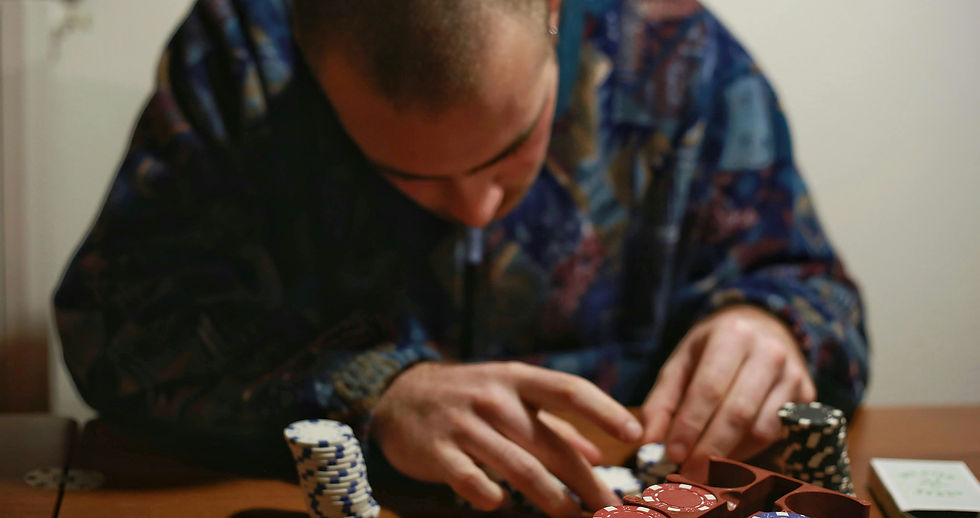Jordan Peterson on Gambling: Surprising Insights You Need to Know
- Nathanael Zibaki

- Aug 9, 2025
- 4 min read

Jordan Peterson is a Canadian psychologist, professor, and bestselling author celebrated for his insights into human behaviour, personal responsibility, and the psychological challenges of modern life. His ability to take complex psychological concepts and make them understandable has earned him a global audience.
Among the many societal issues Peterson has addressed is gambling, a pastime that might seem harmless to some but is deeply destructive for many others.
In an interview on September 17, 2010, with the TVO Today YouTube channel as part of The Sin and The State series, Peterson explained how humans are wired to seek rewards — and how the gambling industry deliberately exploits this wiring for their profit.
The Brain’s Reward System: Why Gambling Hooks Us

Peterson explained that human motivation is largely driven by the brain’s dopamine-based reward system. Dopamine is a neurotransmitter associated with pleasure, satisfaction, and the anticipation of rewards.
In a healthy context, dopamine motivates us to complete useful tasks:
Working hard to achieve a goal.
Learning a new skill.
Building relationships.
But gambling short-circuits this system. Instead of rewarding productive behaviour, it delivers random rewards, and the randomness makes it even more compelling.
Variable Ratio Reinforcement: The Addiction Engine
One of Peterson’s most striking observations involves the concept of variable ratio reinforcement, a term from behavioural psychology. This is a reward system where the reinforcement (the win) comes after an unpredictable number of actions.
Examples in gambling:
A win after 5 spins.
Nothing for 15 spins.
A big win after a long dry spell.
Research shows that variable ratio reinforcement is the most addictive schedule of reward known in psychology. It’s the same principle used to train animals in experiments so they will repeat behaviours endlessly, because the uncertainty of the reward is itself addictive.
The Mathematics of Losing: Why the House Always Wins
Peterson stressed that casinos are not built to let you win; they’re designed to make you lose over time. This is not just a metaphor; it’s mathematically guaranteed.
For example:
Slot machines typically return 85–95% of the money wagered, meaning for every $100 bet, you’ll lose $5–$15 on average.
Over thousands of plays, this small “house edge” guarantees the casino’s profit.
The more you play, the closer your losses will align to that built-in percentage.
It doesn’t matter how “lucky” you feel or what “system” you use, the math always favours the house.
The Hidden Psychological Costs
While financial loss is the most obvious consequence, gambling’s impact goes far deeper. It can cause:
Anxiety & Depression: Constant losses and money worries create ongoing stress.
Shame & Guilt: Many gamblers hide their behaviour from loved ones.
Relationship Breakdown: Trust is often damaged beyond repair.
Work & Career Issues: Distraction, absenteeism, and financial stress spill into work life.
A 2016 study in the journal Addiction found that over 50% of problem gamblers also had depressive symptoms, and a significant portion had suicidal thoughts.
The Illusion of Control
Peterson pointed out another dangerous aspect of gambling: illusory control. This is the false belief that you can influence the outcome of a random event.
Gamblers often say:
“The machine is due to pay out.”
“I just need to change my strategy.”
“I can feel my luck turning.”
In reality, modern slot machines use Random Number Generators (RNGs), making each spin independent from the last. Past losses or wins have no effect on future outcomes.
Case Study: The Slot Machine Spiral
Consider Mark, a fictional but realistic composite based on common gambler experiences:
Mark started playing slots for fun after work. At first, he played $20 here and there. Then, a lucky $500 win made him think he’d found a “system.” He started chasing that feeling, increasing his bets.
Over the next two years:
He lost over $15,000.
He borrowed money from friends, damaging relationships.
He became withdrawn and anxious.
Mark’s story reflects the pattern Peterson warns about — a win early on can create a dangerous belief in personal control, leading to deeper losses and addiction.
Global Statistics on Gambling Harm
2–3% of the population in many Western countries meet criteria for problem gambling (Journal of Gambling Studies).
In Canada, over 300,000 people are estimated to have a gambling problem (Canadian Centre on Substance Use and Addiction).
Problem gambling has one of the highest suicide attempt rates among addictions, second only to opioid dependence.
How to Break Free: Peterson’s Principles Applied
Peterson’s broader philosophy of self-improvement and personal responsibility can help address gambling addiction.
Face the truth: Admit that gambling is designed to make you lose.
Seek help: Groups like Gamblers Anonymous or therapy can provide accountability.
Replace the habit: Find healthy dopamine sources: exercise, creative projects, skill-building.
Build structure: Use routines to avoid idle time when gambling might tempt you.
Set hard barriers: Self-exclusion programs and blocking gambling websites.
Why Gambling Is Not “Harmless Fun”
Some argue that gambling is just entertainment, but Peterson’s analysis suggests otherwise. Unlike buying a concert ticket or going to the movies, gambling’s entertainment value is built on exploiting psychological vulnerabilities.
The casino’s profit model depends on:
Keeping you playing as long as possible.
Using lights, sounds, and “near wins” to create excitement.
Leveraging the brain’s reward system against you.
Final Thoughts
Jordan Peterson’s take on gambling strips away the glamour and exposes the mechanics behind the addiction. It’s not just a matter of “self-control” — it’s a matter of understanding that the system is deliberately engineered to keep you playing, losing, and coming back for more.
The real way to win? Don’t play the game at all.






Comments